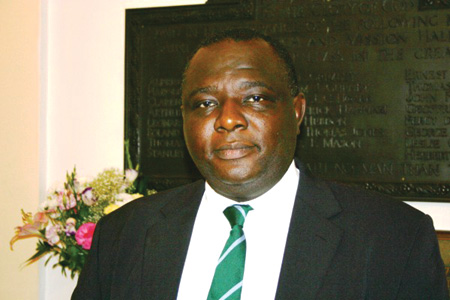
Titus Boye-Thompson Communications Expert
Financial reports have always been very dull and mundane records of the state of affairs of an establishment. They often tend to indicate whether the institution is liquid, illiquid or floating. To the practiced eye, financial reports offer advanced warning that the markets are vulnerable to change or that the trading environment may be structured in such a way as to impinge on the sustainability of a business.
That said, Government financial reports had always been a macro data for financial management with such huge sums of money being talked about, sometimes you are left in a daze. That was in the past. Now, Audit Service Sierra Leone has made a name for itself in a very short time because of its speedy, frank and erudite articulation of financial practices of Ministries, Departments and Agencies in their management of public funds. The Auditor General is a seemingly smart woman, a strong personality with a characteristic flair for determination in the conduct of her duties. The Service has been overhauled and has been designed to adapt itself to the changing signs of our times.
None so better displayed than when in the thrust of the Ebola epidemic, the Audit Service was mandated by His Excellency the President to undertake a snap audit of all funds expended thus far by the National Ebola Response Centre (NERC). In a very short time, the Audit service was able to outline some very alarming events relating to the conduct of financial affairs at the NERC. While no mention was given to HE the President for calling in the Audit Service to undertake this work, it was alarming that the end result of their investigations alluded blame to him for overall mismanagement of the funds.
It was also lamentable that the Audit Service report that came out of audit failed to be subjected to proper scrutiny by Parliament as dictated by law before it was published and left open to the scrutiny of all and sundry. The ramifications of proper checks and balances was lapsed in that where the report falsely alleged non-payment of input tax, or misalignment of receipt and expenditure there was not enough time to correct nor justify any mistake or error in procedures. To assume therefore that for anytime that an Auditor is not presented with a receipt when demanded constitute a criminal offence would be misleading.
Audit Service Sierra Leone is a critical government agency responsible for reporting on financial management of public fund. Their function has been made very public recently because of the fodder for public corruption that is contained in each audit report. It is clear that most of the cases cited in the Audit report, year on year, are replete with errors and omissions, have been explained in logical sequence or may have had no basis for inclusion in an audit. Given the ramifications for public accountability and the questioning of personal integrity, the call is for the Audit Service itself to be subjected to an audit as to whether its functions produce a development quotient for the country or whether in bringing out such alarming statistics, it does more harm than good to the perception of the country and its public officials.
No one is doubting the sincerity of the Auditor General in the conduct of her obligations of office nor for that matter casting aspersions on her staff in the discharge of their duties. However, Audit Service Sierra Leone itself must come under a social audit to confirm that it is indeed complying with the provisions of its own guidelines for probity and transparency in the conduct of public service. The need to subject the Audit Service to scrutiny is based on the fact that for many a time, persons accused by the service of malpractice have been found to have had legitimate reasoning behind their apparent malfeasance or have been found to have complied with the Service’s queries even before their report is laid before the House of Parliament. Having said this, it has always been the case that the Audit report must be scrutinized by Parliament before its contents are open to public discussion.
One must consider what an audit report sets out to do, quite apart from its allusions to creating a pandemic on wastefulness and mismanagement of public funds. It is a technical document designed to form an opinion, one way or another or in some cases, withhold its opinion on the conduct of financial affairs within an organization with respect to its adherence to rules, practices and professional financial accounting guidelines. It is expected to determine whether the organization is run in any manner inimical or detrimental to its own survival, act as a red flag for robust assurances that all financial commitments and reporting of financial transactions are in order and to provide reasonable assurance of financial probity. In the event that the above definitions are accepted, it is clear that the Audit report is a benchmark for financial prudence and a warning light for irregularities. It is for that reason that a critical component of an Audit report is the recommendations and generality of its guidelines that are drafted to secure adherence to proper procedures where this is the opinion of the Auditor that such may be lacking or otherwise necessary for the smooth functioning of financial administration of the entity.
The call for a social audit is to subject the Audit Service to the particularity of the alarmist headlines that are culled from it. In some instances, groups of agencies would be lumped together on a composite allegation of mismanagement when in fact, one member of that group may have had to account for a small proportion of the figure alleged, may have even accounted for that error by way of satisfying the Auditor General subsequently as to the queries raised, but once the report has been made public, no corrections are accepted unless the issue is scrutinized by Parliament.
In the same vein, it would be proper for Audit Service Sierra Leone to give reasons why such errors are allowed in the first place by a recall to their audit, to answer publicly why there were any errors found on the report and for the Auditor General to publish a public rationalization of her report at any time that Parliament absolves any MDA of allegations contained in the Audit report and for the Auditor General to be called to account, to publicly apologize for false claims or improper practice in publishing issues for which they ought to have had proper information that such as they have reported was wrong, erroneous and misleading.
The Auditor General has more recently been concerned with procurement procedures and alleged lapses in the functioning of the procurement guidelines. This enhanced interest is somewhat devoid of the need for exigency and the smooth functioning of administration when the Audit report would identify a procurement event that has a time limit definition to it but yet still refers to sole source and an expedited procurement process as questionable. The question that should be asked is whether the Audit Service has any right to query the procurement route if all proper assurances are in place to support the fact that the procurement law has not been broken. If that is not the case, then to infer wrongdoing on such an event to the extent that it is included in the Audit report is misleading and alarmist. The Auditor General should not be seen to be the judge, jury and executioner in all matters of public fund management when there are other agencies out there doing their work as mandated by Parliament. Maybe it is time that the Audit report stopped being such a sexy document but concentrate on the bread and butter question in the country now. How do we connect?



